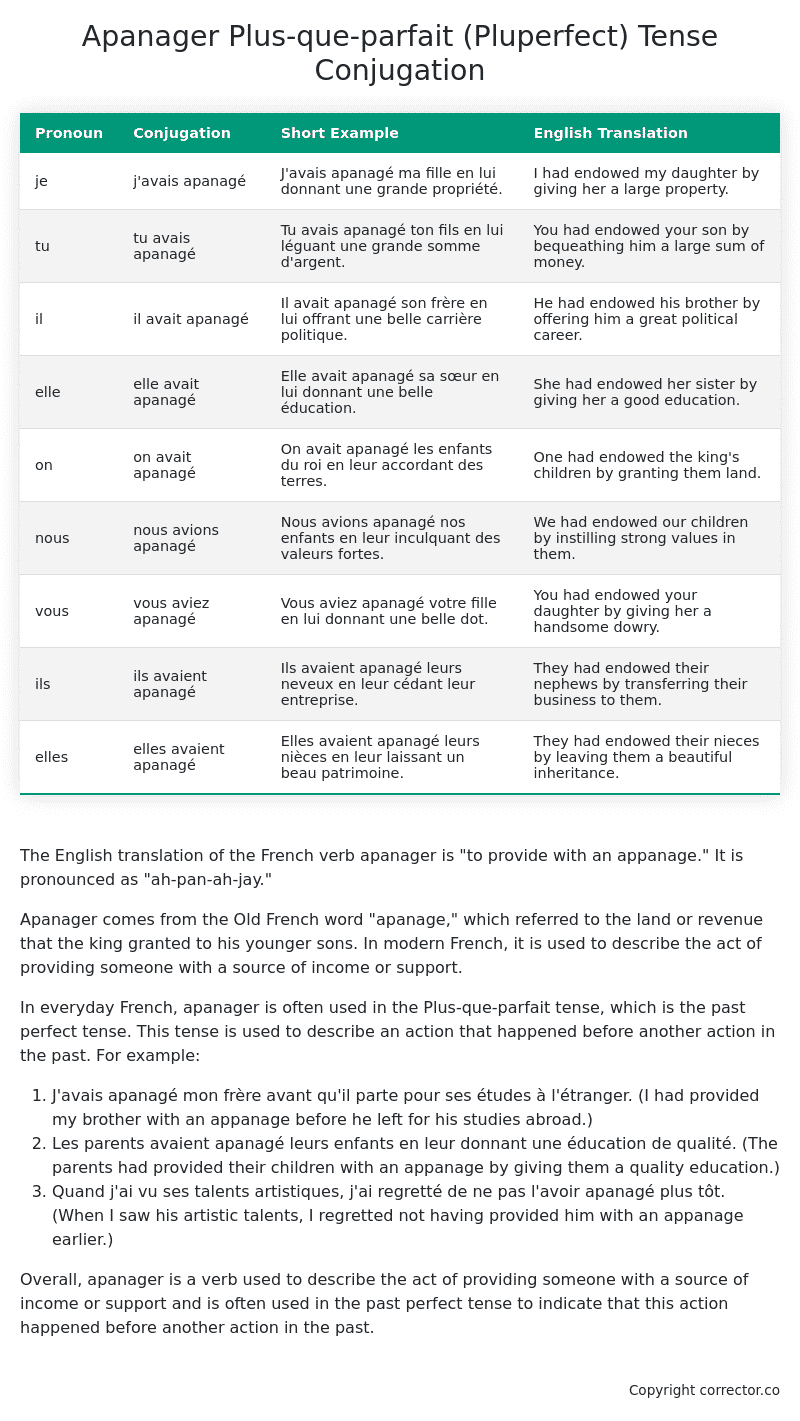Plus-que-parfait (Pluperfect) Tense Conjugation of the French Verb apanager
Introduction to the verb apanager
The English translation of the French verb apanager is “to provide with an appanage.” It is pronounced as “ah-pan-ah-jay.”
Apanager comes from the Old French word “apanage,” which referred to the land or revenue that the king granted to his younger sons. In modern French, it is used to describe the act of providing someone with a source of income or support.
In everyday French, apanager is often used in the Plus-que-parfait tense, which is the past perfect tense. This tense is used to describe an action that happened before another action in the past. For example:
- J’avais apanagé mon frère avant qu’il parte pour ses études à l’étranger. (I had provided my brother with an appanage before he left for his studies abroad.)
- Les parents avaient apanagé leurs enfants en leur donnant une éducation de qualité. (The parents had provided their children with an appanage by giving them a quality education.)
- Quand j’ai vu ses talents artistiques, j’ai regretté de ne pas l’avoir apanagé plus tôt. (When I saw his artistic talents, I regretted not having provided him with an appanage earlier.)
Overall, apanager is a verb used to describe the act of providing someone with a source of income or support and is often used in the past perfect tense to indicate that this action happened before another action in the past.
Table of the Plus-que-parfait (Pluperfect) Tense Conjugation of apanager
| Pronoun | Conjugation | Short Example | English Translation |
|---|---|---|---|
| je | j’avais apanagé | J’avais apanagé ma fille en lui donnant une grande propriété. | I had endowed my daughter by giving her a large property. |
| tu | tu avais apanagé | Tu avais apanagé ton fils en lui léguant une grande somme d’argent. | You had endowed your son by bequeathing him a large sum of money. |
| il | il avait apanagé | Il avait apanagé son frère en lui offrant une belle carrière politique. | He had endowed his brother by offering him a great political career. |
| elle | elle avait apanagé | Elle avait apanagé sa sœur en lui donnant une belle éducation. | She had endowed her sister by giving her a good education. |
| on | on avait apanagé | On avait apanagé les enfants du roi en leur accordant des terres. | One had endowed the king’s children by granting them land. |
| nous | nous avions apanagé | Nous avions apanagé nos enfants en leur inculquant des valeurs fortes. | We had endowed our children by instilling strong values in them. |
| vous | vous aviez apanagé | Vous aviez apanagé votre fille en lui donnant une belle dot. | You had endowed your daughter by giving her a handsome dowry. |
| ils | ils avaient apanagé | Ils avaient apanagé leurs neveux en leur cédant leur entreprise. | They had endowed their nephews by transferring their business to them. |
| elles | elles avaient apanagé | Elles avaient apanagé leurs nièces en leur laissant un beau patrimoine. | They had endowed their nieces by leaving them a beautiful inheritance. |
Other Conjugations for Apanager.
Le Present (Present Tense) Conjugation of the French Verb apanager
Imparfait (Imperfect) Tense Conjugation of the French Verb apanager
Passé Simple (Simple Past) Tense Conjugation of the French Verb apanager
Passé Composé (Present Perfect) Tense Conjugation of the French Verb apanager
Futur Simple (Simple Future) Tense Conjugation of the French Verb apanager
Futur Proche (Near Future) Tense Conjugation of the French Verb apanager
Plus-que-parfait (Pluperfect) Tense Conjugation of the French Verb apanager (this article)
Passé Antérieur (Past Anterior) Tense Conjugation of the French Verb apanager
Futur Antérieur (Future Anterior) Tense Conjugation of the French Verb apanager
Subjonctif Présent (Subjunctive Present) Tense Conjugation of the French Verb apanager
Subjonctif Passé (Subjunctive Past) Tense Conjugation of the French Verb apanager
Subjonctif Imparfait (Subjunctive Imperfect) Tense Conjugation of the French Verb apanager
Subjonctif Plus-que-parfait (Subjunctive Pluperfect) Tense Conjugation of the French Verb apanager
Conditionnel Présent (Conditional Present) Tense Conjugation of the French Verb apanager
Conditionnel Passé (Conditional Past) Tense Conjugation of the French Verb apanager
L’impératif Présent (Imperative Present) Tense Conjugation of the French Verb apanager
L’infinitif Présent (Infinitive Present) Tense Conjugation of the French Verb apanager
Struggling with French verbs or the language in general? Why not use our free French Grammar Checker – no registration required!
Get a FREE Download Study Sheet of this Conjugation 🔥
Simply right click the image below, click “save image” and get your free reference for the apanager Plus-que-parfait tense conjugation!

Apanager – About the French Plus-que-parfait (Pluperfect) Tense
Tense Formation
Common everyday usage patterns
Sequencing of past events
Background information
Hypothetical or reported speech
Interactions with other tenses
Summary
I hope you enjoyed this article on the verb apanager. Still in a learning mood? Check out another TOTALLY random French verb conjugation!


